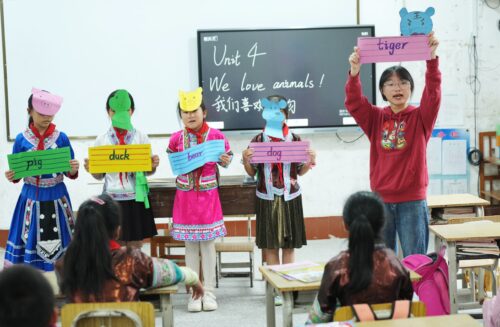A Chinese university seems to be making a list of LGBT+ students. No one knows what it will do with the information.
A major university with three campuses in Shanghai is making a list of all “non-heterosexual” students, according to a leaked document. Is the school just worried about collective political organizing, or does it want to police the bedroom too?

A leaked document that has been doing the rounds on the Chinese internet reveals that Shanghai University (SHU), one of the key institutions of higher learning in Shanghai, is ordering its schools and colleges to report students who identify as LGBT+ or sexual minorities.
The school is targeting anyone who is “non-heterosexual” (非异性恋者 fēiyìxìngliànzhě), and “LGBT rainbow groups” (彩虹族群 cǎihóngzúqún), which it said include:
- Lesbians (女同性恋者 nǚtóngxìngliànzhě)
- Gays (男同性恋者 nántóngxìngliànzhě)
- Bisexuals (双性向者 shuāngxìngxiàngzhě)
- Transgender (跨性别者 kuàxìngbiézhě)
Although it’s unclear at this point what the university needs the information for or whether the move was ordered by Chinese authorities, a large number of LGBT+ activists and supporters have raised serious concerns online, saying that they fear the school’s LGBT+ community will face unfair discipline and other forms of persecution.
The issue was first brought to light by Weibo user Bābǎi Yīwàn Lǐ (@八百伊万礼), who wrote (in Chinese) on August 26, “It looks like Shanghai University isn’t the only university to ask for ‘reports’ on LGBT students and keep track of them. Whether the school’s intention was good or not, this is horrendous.”
His post is accompanied by a screenshot of what appears to be a directive handed down by school officials at SHU. Titled “Campus Survey,” the document says that “in accordance with relevant orders,” the university needs all of its schools to “investigate” and “report” information about LGBT+ students.
The document goes on to explain the scope of the survey, saying that the targeted individuals not only include gay and transgender people, but also anyone who is “non-heterosexual.” Details demanded by the university include students’ “ideological positions” — such as descriptions of their political stances, social contacts, and life plans — as well as students’ “psychological condition,” including summaries of their overall health and “mental disorders” if they have any.
China news, weekly.
Sign up for The China Project’s weekly newsletter, our free roundup of the most important China stories.
Founded in 1922, SHU is a public research university that has three campuses in the city and offers a diverse spectrum of programs across its 30 schools. According to its website (in Chinese), the university has roughly 3,300 faculty members and a total enrollment of more than 55,000 students.
While the university has not yet confirmed that the document was authentic, online responses were immediate and many. At the time of writing, the original post about the new directive has been shared more than 12,000 times and received over 54,000 likes within hours, with the majority of the comments condemning SHU for violating students’ privacy and expressing concerns about the information being potentially used against LGBT+ individuals on campus.
“It’s my personal decision to come out or not. It’s not my obligation. If I’m willing to declare my gender identity, the decision is unrelated to whether you accept it or not. If I prefer not to say, please give me basic freedom as a person,” reads the most-upvoted comment (in Chinese). Another Weibo user wrote (in Chinese), “It sure looks like SHU is compiling a list. This is sad and scary.”
Others pointed out that judging from its wording, participants in the survey not only have to reveal their own sexual orientations but are also encouraged to snitch on classmates who may be secretly identifying as LGBT+.
SHU’s new directive may just be the tip of the iceberg: Some online commenters who attended universities elsewhere and outside the SHU system said that similar documents were in circulation at their own schools. One person revealed (in Chinese) that in a past initiative “a few years ago,” many university advisors tasked with conducting the survey were “furious” over the assignment and fabricated results to protect their LGBT+ students.
On Twitter, Darius Longarino, a research scholar at Yale Law School who studied LGBT rights and gender equality in China extensively, argued that the part where SHU mentions “relevant requirements” was particularly concerning. SHU’s order, he said, was reminiscent of an article published earlier this year in Higher Education Forum, a monthly Chinese journal in the field of higher education.
Tilted “An analysis of the current state of LGBT communities in Chinese colleges and an exploration of countermeasures,” the piece (in Chinese), written by an educator at Shanghai University of Political Science and Law, suggests that student leaders should “collect” information on their LGBT+ peers so that university advisors can assist them to “form correct perspectives on relationships and marriage.”
SHU’s alleged order comes at a time when LGBT+ students on Chinese campuses have been increasingly marginalized, stigmatized, and discriminated against. Last month, in a major blow against LGBT+ awareness and rights in China, Tencent’s ubiquitous social platform WeChat, which is essential for any kind of group communication in China, quietly deleted more than a dozen accounts on LGBT+ topics run by university students. Earlier this year, a court in China’s eastern Jiangsu Province ruled in a landmark case that a university textbook’s description of homosexuality as “a psychological disorder” was not a factual error but merely an “academic view.”
Almost exactly a year ago on August 13, 2020, ShanghaiPRIDE, an annual festival that celebrates LGBT+ people, announced abruptly that it was shutting down, for good. By now it is very clear that the Chinese central government, and in particular the Shanghai city government, wants to stamp out any kind of political organizing connected to LGBT+ causes and identities. What is not yet clear is how into people’s private lives the campaign will go.
Note: We’ve used the term “LGBT+” in this article, as per our house style, but most of the Chinese documents use “LGBT.”






